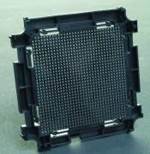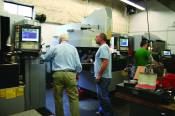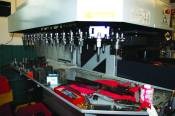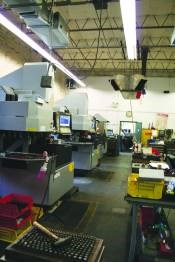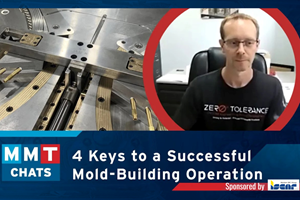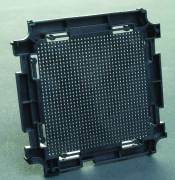LSR/LIM Molding: A Unique Niche
One moldmaker’s decision to venture into liquid silicone rubber/liquid injection molding makes it one of the few shops that can provide molds for liquid silicone.
In order to weather the storm of current economic difficulties, many of today’s mold manufacturers are seeking out new business opportunities to diversify—and thus remain in business—whether it be focusing on a new niche, offering a value-added service, exploring a new industry, finding a new custom base or joining a collaborative effort. LSR Engineering (Lancaster, MA)—a division of Built Rite Tool & Die, Inc.—is one such mold manufacturer. Recently the company decided to foray into the world of LSR molding (liquid silicone rubber/LIM (liquid injection molding) to join the very few in this country that can create flashless, automatic running molds for liquid silicone.
Why Diversify?
According to Craig A. Bovaird, President of Built Rite and all of its divisions (LSR Engineering and Reliance Engineering), the company’s plan for growth has always been aggressive, with a focus on “niche opportunities available from diverse market segments.” The company began to seriously look at the LIM process two years ago. “We really did our homework,” Bovaird recalls. “We felt that it was a good fit as the process is the reverse of injection molding, hot mold, 350-380°F and cold material. This fit well with our existing skill set and it required precise moldmaking capability. That is where our parent company Built Rite came in. We are very strong in mold design and we have invested heavily in the latest machining technology. In the last two years our investment in the mold shop has exceeded $1,000,000. This investment includes two new Sodick sinker EDMs and a Sodick Wire EDM—together with a new Hurco milling center and several other pieces of support equipment.”
The fact that moldmaking and custom molding of LSR takes place under one roof separates LSR Engineering from its competition, Roger Ikonen, Project Manager, notes. “We have invested in all-electric Engel, LIM injection molding machines,” Ikonen says. “The machines and support equipment are all new and state-of-the-art. Our pumping units are made by Fluid Automation. We have doubled our molding facilities square footage to 20,000 square feet. The LSR Division occupies 3,000 square feet of this space. This is first-class space and fully equipped to service our target customer base of medical, defense and aerospace.”
Diving In
LIM of LSR requires a very different way of thinking about the mold, Ikonen notes. “To successfully mold LSR, the most important factor is the mold,” he states. “All design elements must be accounted for at the development stage to ensure success, part design, mold design, material and machine. LSR is a thermoset elastomer and presents unique processing challenges. Due to the material’s low viscosity, it will fill a .0002 opening in steel and flash. As a result, the mold shutoffs have to be better than .0002. Rigid construction is critical together with precise temperature control to prevent flash.
“For these reasons molds require very tight tolerances,” Ikonen continues. “High processing temperatures require an understanding of the interaction between the many mold components in a typical mold and their combined influence on holding tight tolerances. The tolerance requirement does not only apply to the cores and cavities but to the entire system.”
Other critical factors of LSR molds are vacuumization, ejection and venting. “All of our molds have a vacuum seal as an integral design element,” Ikonen states. “Evacuation of air and gas from the cavity is critical to successful LSR molding. Due to the flow characteristics of LSR, conventional ejection is not recommended. Mold designers must consider part removal as a key design element. This can be achieved mechanically—with EOAT—[Ed. Note see MoldMaking Technology February 2009 for more on EOAT] or pneumatically. Each part is different and requires analysis in the design phase to ensure a successful outcome. We use cold runner systems for high cavitation molds and we also use conventional runner systems.”
Partnering with Molders
While the company’s primary focus is with OEMs, Ikonen believes the LSR tooling capability will open up many opportunities with custom molders of LSR. “We have found through our experiences at Reliance Engineering that custom molders do not see us as competitors, but as partners that can offer them a high level of tooling expertise—based on the fact that we also are processors. We also operate under a strict code of ethics that recognizes that customers are sacred and therefore if we are building a mold for a tooling customer, their customer is off-limits.
“Initially our research indicated that the Austrians and Germans are the leaders in LSR tooling and that there are only a handful of companies in the U.S. that make LSR molds,” Ikonen continues. “We have recently completed a 16-cavity cold runner mold for a very close tolerance part. This mold was evaluated by several experienced processors and molding machine technicians; and they indicated that the mold and the parts it produced were world class and equal or better than anything they had worked with. We were very pleased with this feedback and plan a long and successful future in moldmaking for LSR and LIM molding.”
Related Content
Editorial Guidelines: Editorial Advisory Board
The Editorial Advisory Board of MoldMaking Technology is made up of authorities with expertise within their respective business, industry, technology and profession. Their role is to advise on timely issues, trends, advances in the field, offer editorial thought and direction, review and comment on specific articles and generally act as a sounding board and a conscience for the publication.
Read MoreMMT Chats: 4 Keys to a Successful Mold-Building Operation: Innovation, Transparency, Accessibility and Relationship
MoldMaking Technology Editorial Director Christina Fuges chats with Steve Michon, co-owner of Zero Tolerance in Clinton Township, Michigan, about the excitement of solving problems, the benefits of showing gratitude, the real struggle with delegation and the importance of staying on top of technology. This episode is brought to you by ISCAR with New Ideas for Machining Intelligently.
Read MoreThe Critical Role of Management Representatives in ISO 9001
In ISO 9001 quality management systems, the Management Representative (MR) plays a crucial role. While the 2015 version of ISO 9001 no longer mandates this position, having a trusted management member serve as an MR remains vital for streamlining operations and maintaining quality standards.
Read MoreThe Role of Social Media in Manufacturing
Charles Daniels CFO of Wepco Plastics shares insights on the role of social media in manufacturing, how to improve the “business” side of a small mold shop and continually developing culture.
Read MoreRead Next
Specialization and Automation Give Matrix an Edge on Competitors
Mold shop’s focus on high-tech capabilities and full-service operation earns it a niche in precision tools.
Read MoreReasons to Use Fiber Lasers for Mold Cleaning
Fiber lasers offer a simplicity, speed, control and portability, minimizing mold cleaning risks.
Read MoreHow to Use Continuing Education to Remain Competitive in Moldmaking
Continued training helps moldmakers make tooling decisions and properly use the latest cutting tool to efficiently machine high-quality molds.
Read More
